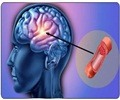Findings from the new study, reflect emerging evidence that young stroke is a growing problem in high-income countries.

What is a Stroke?
Stroke is a major health problem that can have devastating consequences. It happens when the blood supply to the brain is cut off, causing the death of brain cells and dysfunction in one or more parts of the brain. The restricted blood supply can be the result of an artery supplying blood to brain becoming blocked, a blood vessel rupturing causing a bleed inside the brain, or a brief reduction in the blood supply to the brain. The traditional view is that vascular risk factors, such as high blood pressure, diabetes and obesity, play a minor role in young stroke, but recent studies have begun to contradict this view.‘Stroke in young adults can have a huge impact, often occurring when they are starting a family or already have young children to look after, and have yet to reach the peak of their careers.’





Thanks to a research fellowship from the Foundation, Dr. Linxin Li from the University of Oxford is investigating the role of these treatable risk factors in young stroke. Dr. Li’s research focuses on multiple types of strokes, such as ischemic strokes, caused by a blockage of arteries, ’mini-strokes’ (transient ischemic attacks) and bleeding in the brain (intracerebral hemorrhage and subarachnoid hemorrhage).
Strokes in Young Adults
This new study, led by researchers from the Nuffield Department of Clinical Neuroscience at the University of Oxford, is published in a recent issue of the journal JAMA.The researchers explored whether stroke incidence in younger and older people changed from 2002 to 2018, drawing on data from The Oxford Vascular Study, which comprises 94,567 people registered with GP practices across Oxfordshire.
Incidence refers to the number of people who develop a specific disease or health-related event – in this case stroke - during a particular time period.
The researchers also took into account other factors, such as lifestyle, changes in diagnostic practices, control of traditional vascular risk factors, and sex-specific causes of stroke.
Advertisement
Among young people who had a stroke, there was a significant increase in the proportion who were in more skilled occupations, particularly for professional or managerial jobs. This could suggest a role for work-related stress, low physical activity, and long working hours, each of which were more strongly associated with risk of stroke than heart attack.
Advertisement
A linked paper in the current October issue of JAMA Neurology, by the same authors, showed similar divergent trends across other high-income countries in the 21st century, with a fall in incidence at older ages not being seen at younger ages.
Medical Research Foundation Fellow, Dr. Linxin Li from the University of Oxford, said: “Our study shows a worrying rise in young stroke cases across Oxfordshire, reflecting a similar picture across other high-income countries.”
“Establishing the importance of known risk factors in young stroke will help to raise general awareness of the need for better control. We also need better ways of identifying young people at high risk of stroke, as current risk models are based on predictors of stroke in older people.”
Dr. Angela Hind, Chief Executive of the Medical Research Foundation, said: “Historically, we’ve thought of stroke as only affecting older adults, but studies like this suggest a growing problem in young adults.”
“The economic, social and personal consequences can be devastating. More research needs to be done to increase understanding of the causes of young stroke and the best ways of preventing it. This is why we’re supporting researchers like Dr. Li, who are pushing forward the boundaries of knowledge surrounding young stroke.”
The Oxford Vascular Study is funded by the National Institute for Health and Care Research (NIHR) Oxford Biomedical Research Centre, Wellcome Trust, the Masonic Charitable Foundation, and the Wolfson Foundation.
Source-Eurekalert






